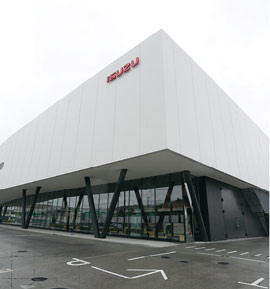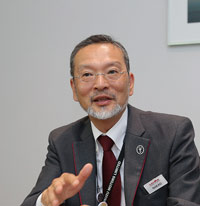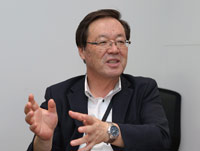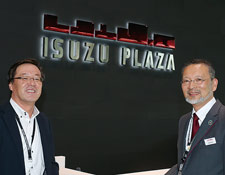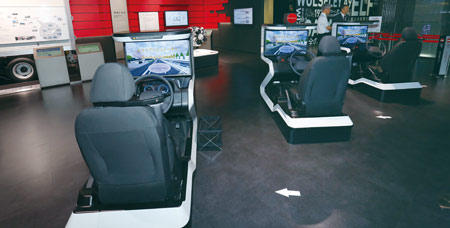|
Isuzu Plaza consists of exhibit spaces on the ground and 2nd floors, and
private spaces such as meeting rooms on the 3rd floor. The ground floor
is laid out with a theme of "supporting transportation", while
the 2nd floor with themes of "motor vehicle production of Isuzu"
and "history of Isuzu". The DS developed jointly with FORUM8
is set up in the area to introduce "motor vehicle production of Isuzu".
This area is set as a social-studies-trip course for fifth grade elementary
students. It is positioned as one of the experiencing items by which visitors
can learn about motor vehicle production from various angles with bodily
sensations.
Unique Ideas Found Everywhere to Have Visitors Perceive Three Themes with Bodily Sensation
"For a wide range of people to come", the left side of the entrance
hall on the ground floor of Isuzu Plaza stages a relaxed space "PIAZZA",
where visitors can sit on multiple chairs, which represent motor vehicles
and cityscape of the logo mark in three dimensions. The back wall presents
the history related to the local city of Fujisawa and Fujisawa plant of
the Company.
On the other hand, adjacent to the reception at the right back, the introductory
display of "supporting transportation" starts. First of all,
the oldest truck in existence "Wolseley CP truck" (designated
as Heritage of Industrial Modernization by Ministry of Economy, Trade and
Industry (METI)) is displayed (all vehicles displayed in the museum are
preserved in working conditions). The following explanations are made in
connection with this. 1) The Company was founded in 1916, when Tokyo Ishikawajima
Shipbuilding and Engineering Co. and Tokyo Gas and Electric Industrial
Co. planned motor vehicle production. It boasts of the oldest history in
Japan as an automobile manufacturer. 2) Then after reorganization and name
changing (including merge with DAT Automobile Manufacturing Inc. and changing
its name into Automobile Industries Co., Ltd.), Tokyo Automobile Industries
Co., Ltd., the predecessor of Isuzu Motors Ltd. was founded in 1937. This
year sees the 81st anniversary.
Next comes "Time tunnel" formed along the route. On the wall
of the passage, epoch-making vehicles and events are displayed with illustrations
and photos including Japan's first domestically produced automobile, "Wolseley
model A-9" (completed in 1922), name change from Wolseley to Sumida
(1928), appearance of the "ELF" first generation model which
would become the Company's bestseller truck (1959), the Company's first
passenger car of house development "Bellel" (1961), the large-size
sight-seeing bus "GALA" (released in 1996), and the heavy-duty
truck "GIGA" (full-model change in 2015).
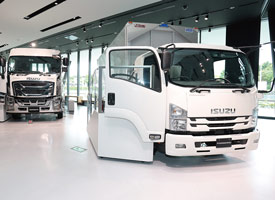 |
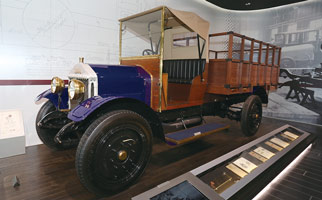 |
The Company's epoch-making products are exhibited age by age.
Wolseley CP truck (right) is designated as Heritage of Industrial Modernization. |
A highlight of introductory display (according to Mr. Nakao), "Miniature
world: supporting transportation" is one of the largest dioramas in
Japan. Pursuing reality, it was designed based on the idea of "God
is in the details" to the fullest. In representing a day in an imaginary
city in 15 minutes, more than 100 scenes are inlaid under the theme of
"supporting transportation". 660 vehicles (some of them are vessels)
including about 200 vehicles manufactured by the Company are placed. Among
them, each of 45 vehicles (43 cars and 2 vessels) travels fully automatically
and turns back to the charging station by itself. They are all fabricated
on the same scale. It is supposed to be the only one diorama in Japan that
has vehicles travelling on it.
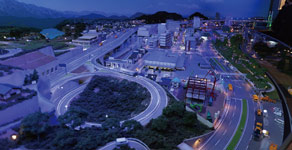 |
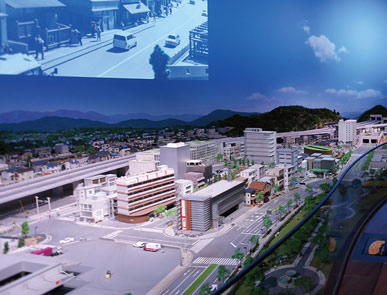 |
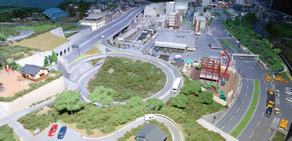 |
"Miniature world: supporting transportation" depicts a day in
an imaginary city "Isuzu city",
where the Company's various vehicles travel |
The next is the corner where visitors can touch or ride Isuzu's latest model of bus, light-duty trucks, medium-duty trucks, heavy-duty trucks and tractors, SUV (sport-utility vehicle) manufactured and sold overseas. Industrial engines for construction machinery and vessels (ships) are also displayed together.
| Since the area of "motor vehicle production of Isuzu" is set as a social-studies trip course for 5th graders, exhibits and images are basically all composed of experiencing items assuming comparatively low points of view. |
|
First of all, at the corner to learn how to manufacture a truck, as many as 13,000 parts of a truck are visualized by comparing them in forms of 2D design drawings and 3D CG simulation. It is so devised that visitors can understand the production line and mechanism of trucks through miniature models (as small as 1/20 of the actual size), images, and real things. Visitors can also experience the production process of trial manufacture, experiments, press, and coating, as well as operation support (preventive maintenance) to keep on "transportation". The section of driving simulators (DS) based on UC-win/Road is also one of the most important part in this area. DS has been introduced here in relation to CSR (corporate social responsibility), providing an opportunity for visitors to experience the Company's new technologies.
|
|
|
The third area "History of Isuzu" is roughly composed of "preceding
famous cars" and "history of technology". The former presents
vintage vehicles with the historical backdrop based on the Company's origin
that dates back to the end of the Edo period. They include "Sumida
Type M Bus" which is restored and the only working Japan's domestically
produced omnibus existing in Japan, "TX80 type truck" which was
active in the post-war years of recovery, the ELF first generation model
which supported the high economic growth period, "Bellel" which
is the first Japanese diesel passenger car of Isuzu's first in-house design,
Chevrolet's pickup truck "LUV" that the Company sold in collaboration
with General Motors (GM) for the first time in Japan, and "Gemini"
which was developed under the first “world car” plan etc. The latter "history
of technology" shows the history of diesel engine technology and successive
representative real engines. It also displays a chronological table to
look back the Company history using 110 miniature cars. 86 of them are
handmade on a scale of 1:43 based on data. There is also a section to introduce
"FD-SI", the concept of light-duty truck of "Future Delivery"
designed by ISUZU, which was exhibited in the 45th Tokyo Motor Show 2017.
The end of the tour is the temporary project exhibition area. When I visited
the Plaza in the end of June, memorial exhibitions of "117-Coupe"
and "Isuzu Plaza" were held. The former commemorates the 50th
anniversary from its release, and the latter the 1st anniversary from its
opening on April 11, 2017. The number of visitors to the Plaza exceeded
100,000 in accumulating total in June 6.
Process of Embodying DS and Current Use
It was early 2014 when establishment of Isuzu Plaza was planned. Mr. Nakao, who had been involved with car design for many years, took charge in direction of its all designs and exhibitions since they started to plan the Plaza. In such early stages, a working group was formed to deal with various projects, in which an opinion arose that a simulator was necessary. It was requested to examine use of simulators for exhibiting advanced technologies about safety and environment that the Company works on with Mr. Konishi as a core person.
"First, we had discussion within (WG) members and made a rough concept
about a simulator to allow people to experience advanced safety technologies
with a large truck, with another content to do something about fuel efficiency."
Later, when there was nothing but outline drawings of the building, with no information about the space where they would be installed or how many simulators would be installed, they made research for realizing this concept. They visited multiple companies to see their products and repeated discussion with them. Then in 2015, they decided to collaborate with FORUM8 for its wide-ranging business performance on simulators etc., as Mr. Konishi looks back.
They developed a simulator jointly based on UC-win/Road DS. It allows two ways of experience having a game feeling: experience of the advanced safety devices while driving a large vehicle, and that of travelling with focus on mileage (fuel efficiency). When a user selects either of Eco and Safety experience courses, fastens the seat belt, and releases the parking brake, DS starts. The Safety experience course realistically reproduces advanced safety devices actually mounted in the Company's commercial vehicles, such as the lane departure warning system and the collision damage mitigation braking system. Moreover, regarding high point of view peculiar to large vehicles, steering angle, the working condition of the brake, and the turning radius differential, they made fine adjustment over and over again until the delivery limit to realize bodily sensation as close as possible to a real car. For example, the Eco experience course that uses an originally created road that goes from Shonandai to Enoshima, or the Safety experience course with a road created using the existing data of UC-win/Road DS shows specific evaluation and rank for each driving operation when the user reaches the goal within a given period of time.
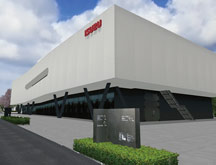 |
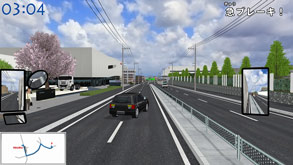 |
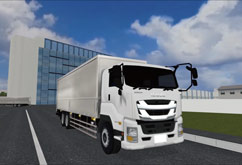 |
| "Eco experience course" reproduces the local road. The driver travels from Shonandai to Enoshima passing the Isuzu Plaza. |
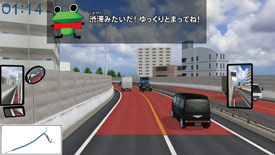 |
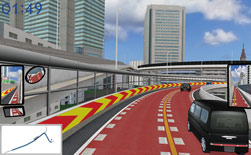 |
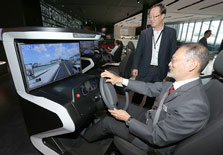 |
| "Safe driving experience course" realistically reproduces high point of view peculiar to large vehicles, steering, braking, and the turning radius differential. |
With many frequent visitors,
DS driving experience is most popular. |
In the Plaza, 3 units of the DS are on permanent exhibition (2 of which were exhibited in the Tokyo Motor Show 2017 only during the show period). They are the most popular items especially for children. There are many frequent visitors. They are so popular that there's a line on Saturdays even after one year and more has passed. Also, during the Tokyo Motor Show, about 2,000 visitors used the DS during the period of 2 weeks. What’s more, Mr. Nakao says that they receive inquiries about the DS from domestic and foreign venders.
"As our technologies of safety and fuel-efficiency ought to evolve
continuously, we think someday we will have to change DS. On that occasion,
we would like to work together for various things so that we can embody
objects more realistically."
|
